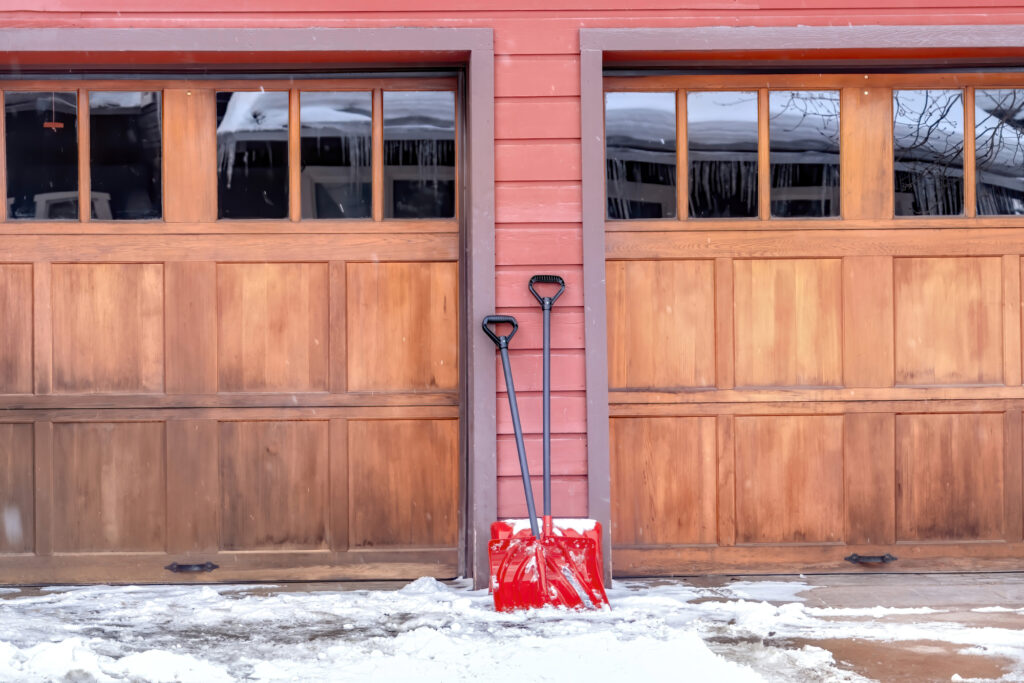Garage door insulation is particularly essential during the winter months, where it acts as a barrier against the outside elements. Beyond providing a shield from the cold, insulation enhances your garage’s usability and extends its impact on the connected living spaces. From safeguarding stored belongings to creating a more stable environment, it is a transformative investment that balances comfort, energy efficiency, and your home’s adaptability to varying climates. We will guide you through the considerations of investing in garage door insulation to achieve a climate-controlled and comfortable garage environment this winter season.
How Garage Door Insulation Works
Garage door insulation works by creating a barrier that reduces heat transfer between the garage’s interior and exterior. This is typically achieved by integrating insulating materials, such as polyurethane or polystyrene foam, into the door’s construction. These materials are thermal insulators, slowing down heat conduction through the door.
The effectiveness of garage door insulation is often measured by its thermal resistance, commonly referred to as the R-value. The R-value is calculated based on factors like the type and thickness of insulation material. Essentially, a material with a higher R-value is more effective in preventing heat movement, whether it’s retaining warmth in cold conditions or keeping cool air in during warmer periods. For insulation purposes, choosing materials with appropriate R-values is vital since they directly correlate with the insulation’s efficiency in maintaining consistent indoor temperatures and reducing energy consumption.
Types of Garage Door Insulation
Polystyrene Insulation
Polystyrene, also known as Styrofoam, is a rigid foam material that comes in panels, typically installed between the metal or wooden panels of the garage door. It is installed by attaching it using adhesives or fitting it into pre-cut spaces in the door.
One of the notable advantages of polystyrene is its cost-effectiveness; it is more budget-friendly than polyurethane insulation. Since it’s relatively lightweight, polystyrene is a versatile option that can adapt to many garage doors. However, it provides less structural rigidity to the door than polyurethane insulation. Polystyrene also has a lower R-value than polyurethane but still provides good thermal resistance.
Polyurethane Insulation
Polyurethane is a foam material that starts as a liquid and expands to fill the space it occupies. It is commonly sprayed or injected between the garage door’s layers. Polyurethane stands out for its high R-value, offering excellent insulation properties. Upon application, it expands to fill gaps, adheres to the door’s surfaces, and forms a continuous layer of insulation. Polyurethane also adds structural strength to the door, contributing to its rigidity and durability. While this material offers superior insulation and structural benefits, it is more expensive than polystyrene, impacting the upfront cost of the garage door.
Benefits of a Well-Insulated Garage Door
Comfortable Temperature
A well-insulated garage door helps maintain consistent indoor temperatures within the garage. This is particularly advantageous when the garage is used for various purposes, such as a workshop, office, or gym. Temperature regulation prevents extreme fluctuations, creating a more comfortable environment and ensuring items stored in the garage are not affected.
Energy Efficiency
Properly insulating your garage door helps minimize heat transfer between the garage’s interior and exterior. The results are a more energy-efficient space, reducing the need for heating during colder months and cooling in warmer seasons.
Increased Durability
By preventing extreme temperature conditions, insulation safeguards materials such as electronics, tools, and household goods, ultimately contributing to their longevity. This also helps avoid rapid expansions and contractions of materials due to temperature variations, minimizing stress on the door’s structure and contributing to its durability. Moreover, insulation acts as a barrier against moisture, reducing the risk of issues such as rust on metal surfaces and deterioration of materials over time.
Cost Savings
Maintaining a stable temperature in the garage decreases the home’s overall energy consumption. The initial investment in insulation can lead to substantial long-term savings by reducing the reliance on HVAC systems to maintain a comfortable indoor temperature.
Noise Reduction
The materials used in insulation have sound-dampening properties that absorb and minimize the transmission of sound waves. This reduces the impact of external noise from entering the garage, such as street traffic or neighborhood activities. Additionally, insulation helps prevent sound reverberation within the garage, creating a quieter and more acoustically controlled environment.

Winter-Warming Effects of Garage Door Insulation
Garage door insulation is one of the most valuable investments you can make to prepare for winter. A well-insulated garage door serves as a thermal barrier, preventing the infiltration of frigid air and the escape of warmth from your home. It not only ensures a more comfortable space within the garage but also has a ripple effect on your home’s overall energy efficiency. By mitigating heat loss and maintaining a consistent indoor temperature, garage door insulation helps reduce heating costs, safeguards stored items from temperature extremes, and creates a more welcoming environment to navigate the winter months. It’s an investment that pays dividends both in immediate comfort and long-term energy savings during the coldest season of the year.
As you weigh your options, consider the specific needs of your garage space, your overall goals for your home, and your budget. Whether through a DIY solution like insulation kits or a professional upgrade, investing in garage door insulation is a practical and impactful way to enhance your living spaces’ functionality, comfort, and efficiency.
At American Garage Door, we understand the unique climate challenges in Denver and can offer insights into the most effective insulation materials for your specific requirements. Contact us today and let our expert team guide you toward a more energy-efficient and comfortable garage space.
